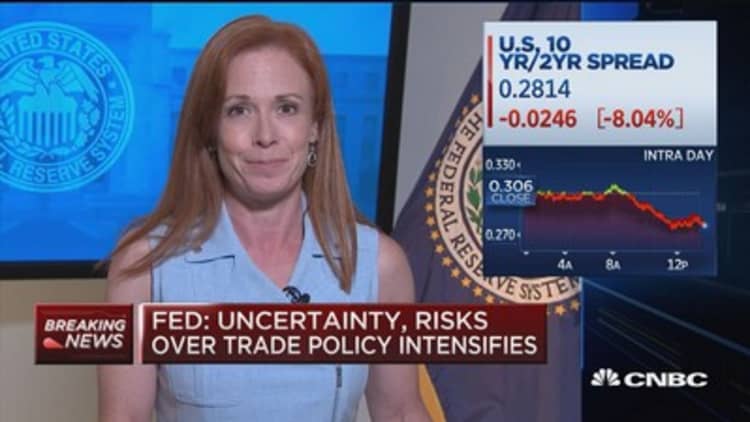Business leaders have started to raise concerns with the Federal Reserve about potentially damaging effects of tariffs as the trade dispute heats up between the United States and its key economic partners.
While tariffs would directly affected sheer trading volume between the U.S. and countries like China and Mexico, company executives — and Fed officials — are more concerned about possible indirect effects, specifically how souring relations could ultimately change how businesses invest.
According to the central bank's latest meeting minutes, business contacts “expressed concern about the possible adverse effects of tariffs and other proposed trade restrictions, both domestically and abroad, on future investment activity.” Further, they indicated “capital spending had been scaled back or postponed as a result of uncertainty over trade policy.”
The problem is not so much that the current tariff proposals would undermine global gross domestic product in a major way, but that business leaders might opt to forgo capital spending and other investments given the uncertainty surrounding trade deliberations.

"Generally, the plan is on: Gradual increases in rates is still what’s on the table," said Putri Pascualy, managing director and credit strategist at PAAMCO. "The one thing I think is notable is the fact that the risk of trade policy, and specifically tariffs, has been identified as the one key factor that could derail the economic engine. The Fed seems less concerned about the economic impact of the tariffs themselves."
"What is potentially important is the impact on confidence," Pascualy added. "It could change peoples or business’ plans on investment."
Such a widespread shift could be so significant as to hamstring such of the positive impact derived from last year's tax cuts and federal spending.
“Most participants noted that uncertainty and risks associated with trade policy had intensified and were concerned that such uncertainty and risks eventually could have negative effects on business sentiment and investment spending,” the Fed minutes continued. Members saw fiscal policy – last year’s tax cuts as well as increased spending plans – as “supportive of economic growth” and posing “upside risks,” though a few worried that it is unsustainable.
"The implications [of an escalating trade war] will surely be much further reaching," said Ian Lyngen, head of U.S. rate strategy at BMO Capital Markets. "The knee jerk market reaction will likely be to the severity or lack thereof in China’s response, however the longer-term fundamental fallout on global demand/inflation remains our primary concern. Higher input costs are already flowing through to U.S. producers, and beginning Friday the additional $34 billion of goods that will now be subject to tariffs will further exacerbate the pain felt as a result of the protectionist measures."
—CNBC's Jeff Cox contributed to this report.


